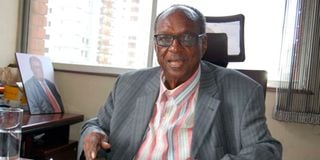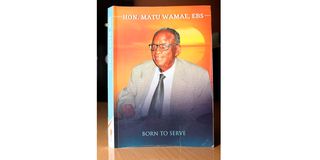Premium
Matu Wamae: How we defeated Kanu in 2002

Mr Matu Wamae during an interview at his office at Ngong Hotel in Nairobi on May 23, 2021.
What you need to know:
- The book chronicles significant memories from the pre-colonial, colonial to post-colonilal times through the 84-year-old’s eyes.
Born to Serve offers a sneak peek into a number of events that shaped the political, social and economic footprints of the country.
Mr Eliud Matu Wamae is a political giant. He served as Mathira MP for three uninterrupted terms between 1983 and 2002. However, his involvement in politics began many years before that.
Born in 1937 in Kianyingi in the present-day Nyeri County to Patrick Wamae wa Kirocho and Anastacia Wambura, Mr Wamae has lived through different epochs in Kenya’s history.
And in Born to Serve, he packs a captivating memoir tracing his gallant journey as a small boy born in the slopes of Mt Kenya to his service to the nation, both in the political field and other arenas for close to six decades.
The book chronicles significant memories from the pre-colonial, colonial to post-colonilal times through the 84-year-old’s eyes.
Narrated in the first-person voice, the book offers a sneak peek into a number of events that shaped the political, social and economic footprints of the country.
However, one of the most interesting sections of the book comes in Chapter 20. Here, Wamae lifts the lid on some of the intrigues that characterised one of the most important years in Kenya’s political history – 2002.
This is the year ODM leader Raila Odinga made one of the shortest but most important political phrases in Kenya’s history: “Kibaki Tosha!”

The cover page of Matu Wamae's book Born to Serve.
This declaration, to most people, was a defining moment in liberating the country from the shackles of the Kanu rule under the late President Daniel arap Moi.
The former premier was hailed as having sacrificed his political ambitions in favour of ridding the country of the Moi era. Little has been said openly about the circumstances or the intrigues that led to the declaration.
According to Mr Wamae, however, as a member of the team that negotiated for a single presidential candidate to end Kanu’s rule, circumstances could have forced Mr Odinga to make the declaration as he had no other choice.
In the book, the former Mathira MP says Raila found a ship that had already revved its engine ready to leave the shore with the captain and his co-captain also set.
Mr Wamae points out that Raila found the National Alliance of Kenya (NAK) already settled on both Mwai Kibaki and the late Kijana Wamalwa as its presidential candidate and running-mate respectively.
He says the NDP faction in Kanu led by Raila – together with the late George Saitoti, Moody Awori and Kalonzo Musyoka – left the founding party when it was too late and the elections were just around the corner. They could not form their own political party for the 2002 General Election. They, therefore, opted to join the Liberal Democratic Party (LDP), which joined NAK to form the National Rainbow Coalition (Narc).
“When LDP joined us, they found that we already had our own presidential candidate and a running mate. This set up did not change when the new team from Kanu joined us,” he narrates in the book.
Bad leadership
The pioneer executive director of Industrial and Commercial Development Corporation (ICDC) also delves into the culture of “use and dump” in Kenya’s politics, which he was also a victim of.
As part of the 2002 team, he had been promised direct nomination to run for the Mathira parliamentary seat on a Narc ticket for his role in campaigning for Kibaki.
To his dismay, however, nominations were held and he was beaten by the late Nderitu Gachagua. He had to swallow the humble pie as his dedication to campaign for Kibaki at his own expense got a shock reward.
In the book, published this year by Neno Publishers, the former chairman of New KCC also brings to the fore how bad leadership in the country made it fail to live to its burgeoning promise when it gained independence.
Particularly, he has no kind words for the late President Moi, blaming him for almost grounding the country during his 24-year reign.
He blames Moi for opening up the country to imported second-hand clothes that led to the death of the textile industry in the country, printing money during elections thus fuelling inflation to presiding over political dictatorship and violence.
He also blames Moi for scheming for the suffering of people from the Mount Kenya region once he assumed power by allowing his government to introduce legislation aimed at stifling businesses and undertakings from the area.
Greatest evil
This emboldened Gema to stay united as it was the only way to strengthen the communities Moi had targeted.
The 284-page book also highlights his years of political battle for the Mathira parliamentary seat with his political nemesis Davidson Ngibuini Kuguru.
Divided into 22 chapters, the book also delves into the pain and suffering that families associated with Mau Mau fighters had to endure in the Mount Kenya region.
But in the pain, the region got a head start in terms of development as colonialists paved roads in the area that they used to transport weapons to fight the freedom fighters.
This was a blessing in disguise as it ended up opening up the region and enabling many economic activities to thrive.
In his parting shot, the political and corporate guru avers that Kenya has a bright future, but only if leaders in the public and private sectors stop being greedy and corrupt and put the right people in the right places.
“Corruption is the greatest evil I have witnessed in my rich career... It has destroyed our economic, social and political fabric, leaving our people impoverished.”





